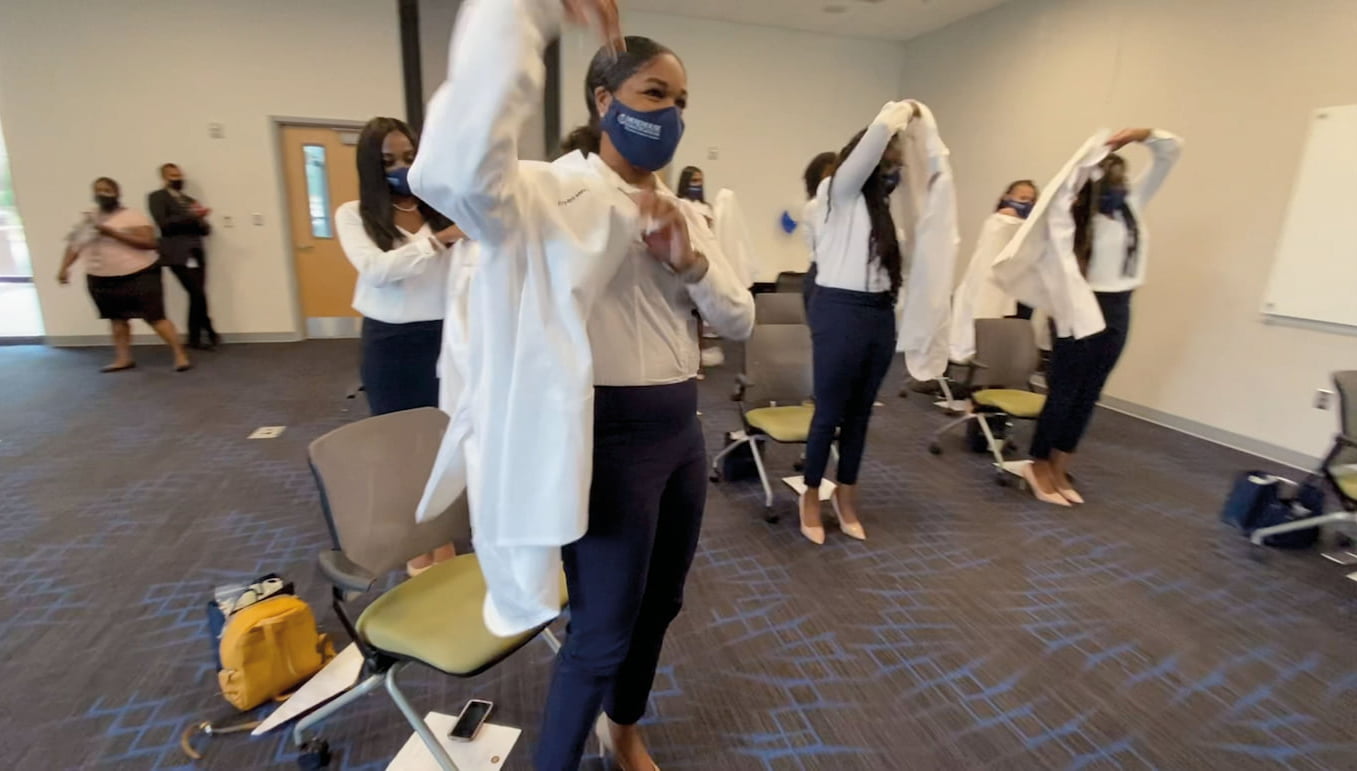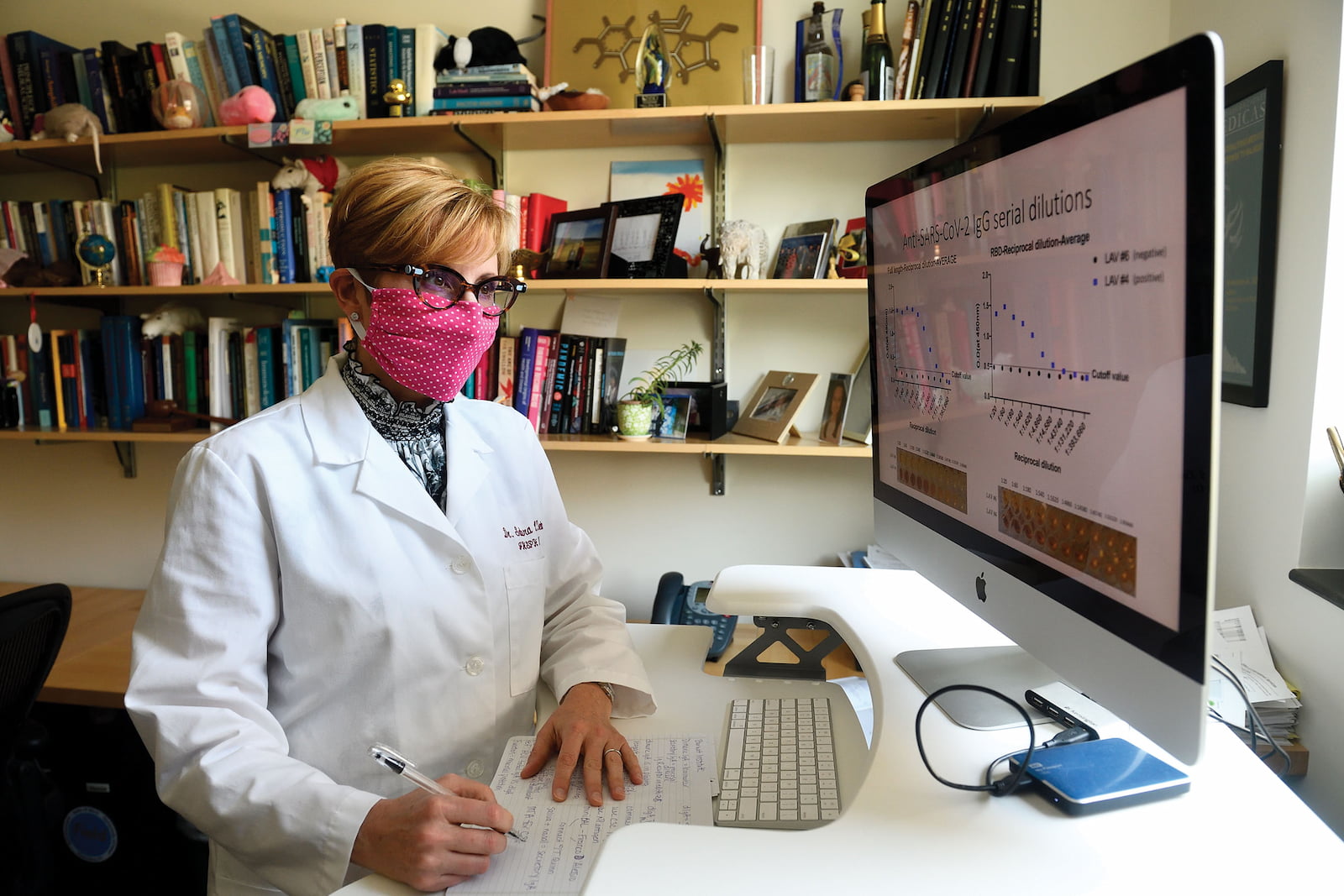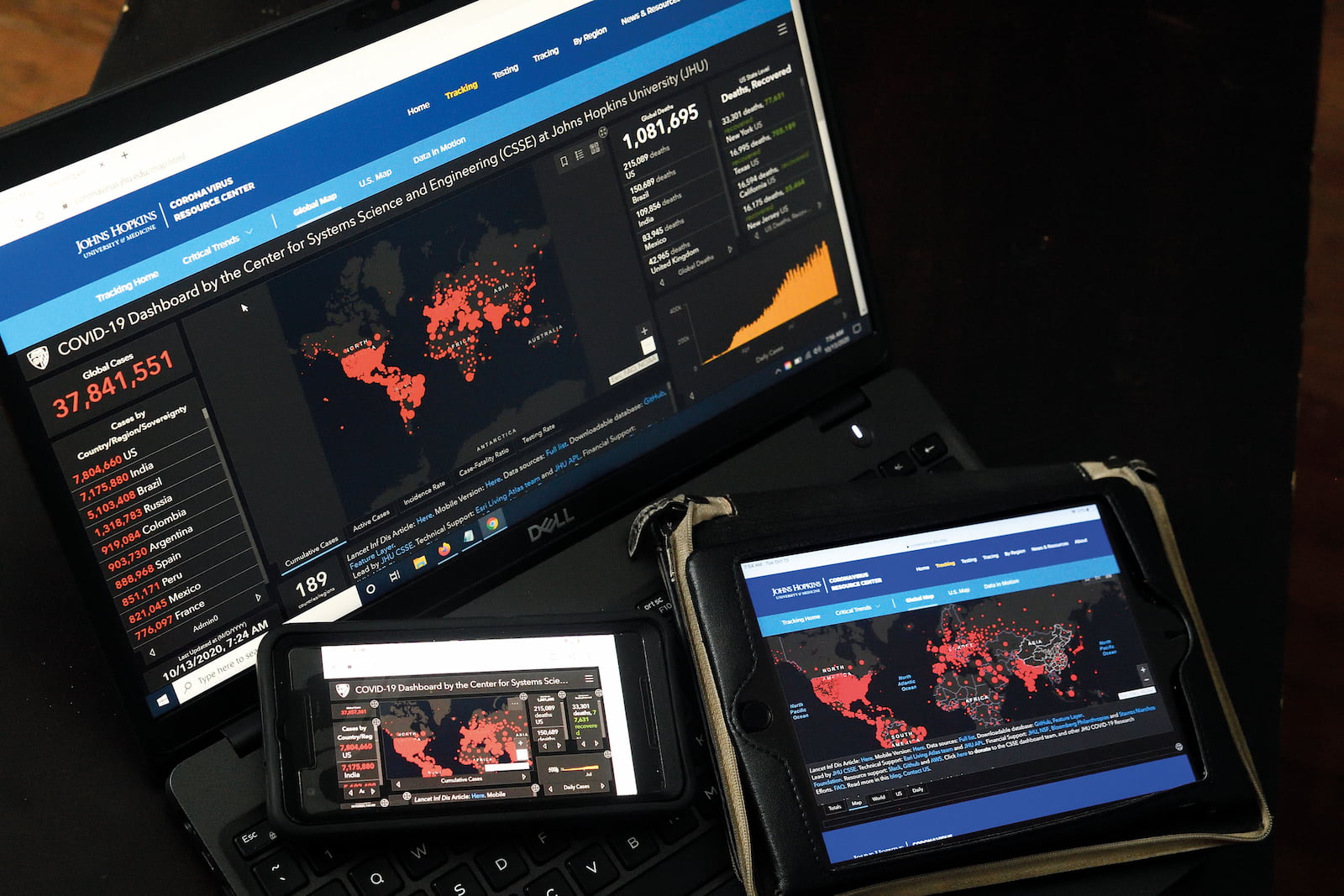Annual Letter on Philanthropy
“Despite all that we faced in 2020, I’m more optimistic than ever about our ability to tackle the big challenges we face. To succeed, it’s imperative that we apply what we have learned during the pandemic.”
Michael R. Bloomberg
Many people have remarked that they’d like to forget that 2020 ever happened. But the fact is, there’s never been a year more important to remember — and learn from.
We faced four historic crises in 2020: a new global health crisis, an accelerating climate crisis, an American political crisis four years in the making, and a long-simmering crisis of racial injustice that finally reached a breaking point. The end of the year did not end any of the crises. In fact, in many ways, each continued to get worse as the year went on. The calendar will not save us. We have to do it ourselves, and that has been the focus of our work at Bloomberg Philanthropies.
As 2020 began, I was in the middle of a campaign to address the political crisis. I threw my hat in the ring to run for president because, as I said many times on the campaign trail, Donald Trump was an existential threat to our democracy. I ran to prevent the country from suffering four more years of dysfunctional, divisive, and reckless leadership in the White House, leaving us to continue descending further away from our greatest strengths: our sense of unity as Americans, our respect for our allies abroad, and our commitment to freedom, equality, and democracy, here and around the world. While our campaign fell short, I never gave up on the ultimate objective: bringing new leadership to the White House.
Over the course of the election, I supported ad campaigns highlighting important issues in key states, including a major investment in Florida that allowed the Biden-Harris campaign to focus more of its resources on other battleground states that wound up tipping the balance in their favor — including Michigan, Pennsylvania, and Wisconsin. I also supported grassroots groups working to protect voting rights and increase turnout, including Stacey Abrams’ group Fair Fight, which helped to turn Georgia blue in November and flip both Senate seats to Democrats in the January runoffs. And I continued to support Everytown for Gun Safety’s efforts to improve public safety and elect gun-sense champions. Throughout the final weeks of the campaign, the political data operation we had created, Hawkfish, sounded the alarm about the possibility of a “red mirage” phenomenon in which President Trump would falsely declare victory before all votes were counted — precisely what he did. It was a disgraceful assault on our democracy, and with his enablers in Congress cowardly refusing to condemn it, the president continued to attempt to overturn the will of the people, including by inciting supporters to block the certification of the election by Congress. In trying to do so, a mob violently stormed the U.S. Capitol and left a number of people dead. The possibility of another four years of President Trump could have been catastrophic to our Constitution and democracy.
The same idea that led me to run for president and remain involved in the 2020 campaign — stepping up to offer leadership during a severe national crisis — defined our work fighting the COVID-19 pandemic, beginning just a few days after my campaign ended.
“There’s never been a year more important to remember — and learn from.”
In early March, with nothing but denial and obfuscation coming from the White House regarding COVID-19, Bloomberg Philanthropies set out to help fill the leadership vacuum. We looked for ways we could step in when Washington stepped back by empowering mayors on the front lines of the crisis, creating a much-needed contact tracing program that we made available globally, and supporting critically important data collection. And that was just the beginning.
The coronavirus also highlighted issues of racial inequality and injustice that have been allowed to fester. In May, when the killing of George Floyd shocked the nation and galvanized protests around the world, our team was already hard at work bringing to life the Greenwood Initiative, which our campaign had developed to increase Black wealth. With COVID-19 claiming so many Black lives — Black people in the United States are dying from COVID-19 at a rate nearly three times that of white people — we quickly decided to expand the initiative’s ambitions to help address the issue and one of the factors driving it: the shortage of Black doctors. The fact is: Black patients overall have better outcomes when they are treated by Black physicians, but only five percent of practicing doctors in the United States are Black.
The large student debt that often comes with medical school is partly responsible for the shortage by deterring many talented students from pursuing careers in medicine. The pandemic could make the problem worse, because the financial strain on families means fewer students will be able to afford medical school. It’s a serious problem that hasn’t gotten enough attention. So, our foundation took action.
This past summer, Bloomberg Philanthropies made a gift of $100 million to the nation’s four historically Black medical schools — Charles R. Drew University of Medicine and Science, Howard University College of Medicine, Meharry Medical College, and Morehouse School of Medicine. The schools are using the funds to make medical school more affordable, helping to ensure that more students graduate and go on to careers in medicine. More Black doctors will mean more Black lives saved and fewer health problems that limit opportunity in Black communities.
The battle against COVID-19 has highlighted valuable lessons that we can apply to other major challenges facing our world, including the battle against climate change — and that starts with the importance of urgency. We saw the horrific damage that can occur when the White House sits back and allows a crisis to spiral out of control. Complacency is deadly. Urgency is life-saving. As I see it, we can win the war against climate change if we apply this and other lessons from the fight against COVID-19 — and here are five of the most important:
Elect leaders who aren’t afraid to face the facts.
The White House response to the pandemic was a case study in incompetence, and it sprang from the delusion that pretending something isn’t happening can make it so. From the beginning, the president and his top advisors played down the dangers of the pandemic, sowed doubt in science, undermined experts, and peddled outright falsehoods. In all of those ways, the administration’s response to the pandemic mirrored the way some politicians have responded to the threats of climate change, with similar results: confusion, distrust, and a lack of progress. Our ability to confront the coronavirus or climate change or any other major challenge depends on leaders who are willing to face up to reality and tell the truth, even if it’s not what people want to hear, and who act decisively and do what’s right, even when it’s not popular.
Promote public-private partnerships.
From the beginning of the pandemic, public health experts made clear that an important tool to contain the spread of the virus would be the practice called contact tracing. It’s a way to gather contact information for, and then inform, people who may have been exposed to an infected person — and it has been used successfully for years to fight tuberculosis, SARS, Ebola, and other diseases. In the absence of federal leadership and support, the work of building and implementing contact tracing programs largely fell to cities and states. But many lacked the resources or expertise to do it effectively, and so we stepped in to help.
During the first wave of the pandemic, Bloomberg Philanthropies teamed up with Governor Cuomo and New York State to create the nation’s largest contact tracing program. As part of that effort, we worked with Johns Hopkins University to create a training curriculum and then made it available for free around the country and the world. More than one million people have taken the course, from 50 states and more than 150 countries, and local health departments in more than 35 U.S. states have made the course a requirement for contact tracers.
At the same time, partnerships between governments and businesses have made possible the unprecedented speed of coronavirus vaccine development. Just think of what we could accomplish if we brought that same spirit of urgency and partnership to the fight against climate change. One important way to do that is to increase government funding for research and development, including toward clean energy and other technology aimed at reducing carbon emissions. The Trump administration called its support for vaccine development Operation Warp Speed. The Biden administration should develop, in partnership with industry leaders, its own warp speed R&D plan for clean energy.
The coronavirus has also highlighted the importance of international partnerships. Like climate change, the pandemic is a global challenge that requires global cooperation. No one country can defeat it alone, and we all benefit from one another’s success. The more that we work together — across the public, private, and nonprofit sectors, and across borders — the faster we can make progress.
Empower local leaders.
Mayors are among the first to see problems as they arise. This year, mayors often learned before state or federal officials when hospitals were approaching capacity or local transmission was increasing. And they often learn first when neighborhoods are flooding from coastal storms or threatened by wildfires fueled by climate change. They are the officials that residents turn to first for answers and for help — and mayors’ decisions tend to be guided by pragmatism, not partisanship.
In the absence of a coordinated national strategy to defeat the pandemic, the role of local governments became even more important, and they responded. Mayors from both parties acted quickly and boldly to confront the pandemic — embracing science, studying data, and supporting safety measures like mask-wearing and social distancing. At the same time, local government budgets around the country took a major blow from the pandemic as business closures decimated local revenue streams that support city services people depend on.
Helping local governments both fight the virus and bridge budget gaps should have been a top priority for the federal government. Instead, the administration largely left cities and states to fend for themselves — and, to make matters worse, many cities were left handcuffed or undermined by state leaders who took their cues from the White House and its strategy of see no evil, hear no evil, speak no evil.
In the early days of March, Bloomberg Philanthropies created the COVID-19 Local Response Initiative, which has provided mayors with regular briefings by leaders in public health and management — including three former presidents and our newly elected president. We teamed up with the National League of Cities to create an online database of policies mayors have adopted to protect people and support local economies that other mayors can reference and learn from. We worked with the United States Conference of Mayors to provide fiscal counseling and resources to help mayors deal with the devastating budget shortfalls caused by the pandemic, including assistance accessing federal aid. And through our global Partnership for Healthy Cities network, we gave local leaders across the globe a way to share strategies for fighting the virus.
City networks are a powerful tool for spurring progress, and not only when it comes to public health. The same kind of information-sharing that has aided mayors during the pandemic is also essential in the fight against climate change. Bloomberg Philanthropies has invested heavily in local climate networks, through efforts including C40, the American Cities Climate Challenge, and the Global Covenant of Mayors. By joining, cities learn what works and what doesn’t and get access to valuable resources and expertise that may not be available locally. Here in the United States, while the Trump administration tried to roll back standards that cut emissions and protect the environment and public health, cities (often with crucial support from their states) have been able to help our country continue reducing pollution and emissions in key areas.
Follow the data.
In the heat of the pandemic, the Trump administration ordered hospitals to bypass the Centers for Disease Control and Prevention and send virus data directly to a private management company contracted by the federal government. There was an uproar among scientists, public health experts, and elected officials about whether that data could be used to support a political position rather than scientific fact — and rightly so. Leaders need reliable, non-biased data in order to make decisions and allocate resources. In a pandemic, it can mean the difference between life and death.
Data is a guiding principle for Bloomberg Philanthropies — we go by the mantra: In God we trust; everyone else bring data. We helped to provide essential data during the pandemic in a number of ways: through our contact tracing partnership with New York State, by sharing it with mayors in the United States and around the world, by helping low- and middle-income countries measure the effectiveness and public acceptance of virus safety measures, and much more. One of our foundation’s closest partners — my alma mater, Johns Hopkins University — created, with our support, one of the most important tools of the pandemic: an online dashboard that tracks case numbers and trends from the country level down to the local level. Governments and business leaders across the world have used the dashboard to make important decisions, including where and when to recommend safety measures. During our regular briefings for mayors, public health experts — including Director of the National Institute of Allergy and Infectious Diseases Dr. Anthony Fauci and Johns Hopkins Bloomberg School of Public Health Vice Dean Dr. Josh Sharfstein, who also leads the Bloomberg American Health Initiative — walked through the latest data and offered guidance for how mayors could put it to use and save lives.
Data is critical in preventing the spread of a deadly virus and also in preventing the worst impacts of climate change. But right now, we don’t have the data we need to do that as quickly and effectively as possible.
Bloomberg Philanthropies is working to close that data gap. We lead a number of efforts to improve the climate data available to decision-makers — including the Task Force on Climate-related Financial Disclosures (TCFD), which helps companies measure and report the climate-related financial risks and opportunities they face. This information helps inform better decision-making by lenders, insurers, and investors, ultimately increasing the flow of capital to investments that can mitigate the effects of climate change. In 2020, the global group of organizations supporting the TCFD guidelines continued to grow: There are now more than 1,700 companies and organizations in almost 80 countries supporting the TCFD guidelines. In addition, a number of countries announced they will make climate risk disclosure mandatory, including New Zealand and the United Kingdom.
Racial inequality kills.
The harms from climate change, like those from COVID-19, often fall heaviest on low-income areas and communities of color, including diseases linked to air and water pollution, such as cancer, asthma, and heart disease. Around the world, disadvantaged communities are often the most vulnerable to the effects of climate change, from coastal flooding and violent storms that damage homes to severe droughts that threaten crops and access to clean water. Investing in more clean energy won’t only protect the planet; it will also reduce racial health disparities and help to fight inequality.
For a long time, air pollution was accepted as an unfortunate but unavoidable cost of powering the planet — and the communities that were worst hit often lacked the resources to go toe-to-toe with the biggest polluters and demand change. For the past decade, Bloomberg Philanthropies has been leading the charge to close coal-fired power plants, which are the single largest source of carbon emissions globally and pollute the air and water with toxic chemicals. That pollution — and the serious health problems it causes — is often most acute in low-income communities of color. Working with local and national organizations across the country, we reached another milestone in 2020: More than 60 percent of U.S. coal plants have now closed since 2011 and the number of deaths from coal pollution has plummeted. In fact: Despite his false promises to save the coal industry, coal plants closed at an even faster rate under President Trump than they did under President Obama.
The four crises that shaped 2020 are far from over: 2021 tragically began with daily COVID-19 cases and deaths at all-time highs in the United States. Last year was officially the second hottest on record and brought harrowing evidence of the growing impacts of climate change, including devastating wildfires in the American West. The storming of the U.S. Capitol by a violent mob goaded on by President Trump was a stain on our country and showed how much work must be done to repair the chaos, anger, and division of the last four years. And Black people in the United States continue to be hit hardest by the health and economic fallout from the virus. But the rollout of vaccines, and the beginning of a new administration in the White House, are reasons to be hopeful about what lies ahead. I’ve always believed that there is far more that unites us than divides us. And despite all that we faced in 2020, I’m more optimistic than ever about our ability to work together to tackle the big challenges we face, including climate change. To succeed, it’s imperative that we apply what we have learned during the pandemic — and, if we do, we will be able to do more than leave the tragedy of 2020 behind us. We’ll be able to build a safer, healthier, and stronger future for generations to come.



